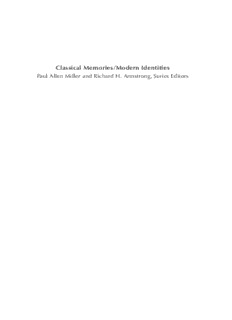
Postmodern Spiritual Practices Paul Allen Miller PDF
Preview Postmodern Spiritual Practices Paul Allen Miller
Classical Memories/Modern Identities Paul Allen Miller and Richard H. Armstrong, Series Editors Postmodern Spiritual Practices THE ConSTRuCTion of THE SubjECT And THE RECEPTion of PlATo in lACAn, dERRidA, And fouCAulT Paul Allen Miller The OhiO STaTe UniverSiTy PreSS Columbus Copyright © 2007 by The Ohio State University. all rights reserved. Library of Congress Cataloging-in-Publication Data Miller, Paul allen, 1959– Postmodern spiritual practices : the construction of the subject and the reception of Plato in Lacan, Derrida, and Foucault / Paul allen Miller. — 1st ed. p. cm. — (Classical memories/modern identities) includes bibliographical references and index. iSBn-13: 978-0-8142-1070-3 (cloth : alk. paper) iSBn-10: 0-8142-1070-8 (cloth : alk. paper) 1. France—intellectual life—20th century. 2. Plato—influence. 3. Lacan, Jacques, 1901– 1981. 4. Derrida, Jacques, 1930–2004. 5. Foucault, Michel, 1926–1984. i. Title. DC33.7.M539 2007 194—dc22 2007015287 This book is available in the following editions: Cloth (iSBn 978-0-8142-1070-3) CD-rOM (iSBn 978-0-8142-9147-4) Cover design by Dan O’Dair Type set in adobe Sabon Printed by Thomson-Shore, inc. The paper used in this publication meets the minimum requirements of the american national Standard for information Sciences—Permanence of Paper for Printed Library Materials. anSi Z39.48-1992. 9 8 7 6 5 4 3 2 1 For Carl Rubino and Wendy McCredie and the summer we read Hegel. “The true human body is the bones and marrow of the realm beyond consciousness and unconsciousness. just raising this up is the study of the way.” dogen (1200–1253 CE) Contents acknowledgments ix Chapter 1 introduction: remaking the Soul: antiquity, Postmodernism, and Genealogies of the Self 1 Chapter 2 The Modernist revolt: history, Politics, and allegory, Or Classicism in Occupied France 27 Chapter 3 historicizing Transcendence: Antigone, the Good, and the ethics of Psychoanalysis 61 Chapter 4 Lacan, the Symposium, and Transference 100 Chapter 5 Writing the Subject: Derrida asks Plato to Take a Letter 133 Chapter 6 The art of Self-Fashioning, or Foucault on the Alcibiades: Caring for the Self and Others 178 Chapter 7 Searching for a Usable Past 227 appendix Queering alcibiades: Persius on Foucault and halperin 231 Works Cited 237 index 261 Acknowledgments Like all books this one has many beginnings. One of its most impor- tant, however, took place in the office of Professor Wolfgang haase at Boston University in the winter of 1998. Professor haase generously invited me to be a plenary speaker at that summer’s meeting of the international Society for the Classical Tradition in Tübingen. he then asked what i would like to speak on. i said “the classical roots of post- structuralism.” i remember thinking to myself as i left his office, “boy you’ve really done it this time. now you’ve got to write this thing. you don’t know a thing about it.” There followed several months of fever- ish work. The resulting address and later article, “The Classical roots of Poststructuralism: Lacan, Derrida, and Foucault” (International Journal of the Classical Tradition 5.2 [1998]: 204–25), was in many ways the first draft of a book i might have never written otherwise. i thus owe a deep debt of gratitude to Professor haase for the confidence he showed in a newly minted associate professor from a modest uni- versity in west Texas. in the ensuing years, numerous friends and colleagues have pro- vided emotional, intellectual, and moral support for this project. Sha- ron nell and Micaela Janan both read the entire book in draft form and provided crucial help with clarifying obscure formulations, eliminating errors, and unknotting tangled webs of argument. victoria Wohl read and offered sound advice on chapters 3 and 4. Jill Frank did the same for chapters 3 and 6. Mary ann Friese Witt provided invaluable advice on chapter 2, as did Peter Burian on chapter 3, and Chuck Platter on chapter 6. David Wray, who identified himself as one of the readers for The Ohio State University Press, gave the manuscript a detailed and acute reading, and the final result is inestimably improved by his • ix • x Acknowledgments extraordinary care. The other anonymous reader provided additional sound advice, and eugene O’Connor was a wonderfully supportive edi- tor. all remaining errors and infelicities are thus stubbornly my own. This book could not have been written without the generous sup- port of a sabbatical provided by the University of South Carolina and a grant from the national endowment for the humanities. i owe a debt of gratitude to both. The year i was able to devote to research and writing was one i will always cherish. Finally, i must thank my teachers, in particular Carl rubino, who first showed me that the greatest classicists were not those who had simply accumulated the most information, but those who also reflected on their practice in a sustained and sophisticated manner. i also owe an unpayable debt of thanks to my long-suffering wife, ann Poling. really, honey, someday i’ll slow down. and to you, Sam, the boy with the Mohawk who asks about Plato, all i do is really dedicated to you. Chapter 3. section 3, appears with the permission of Phoenix. Chap- ter 6, section 1b, first appeared in the journal, Foucault Studies, and is reprinted here by permission.
Description: